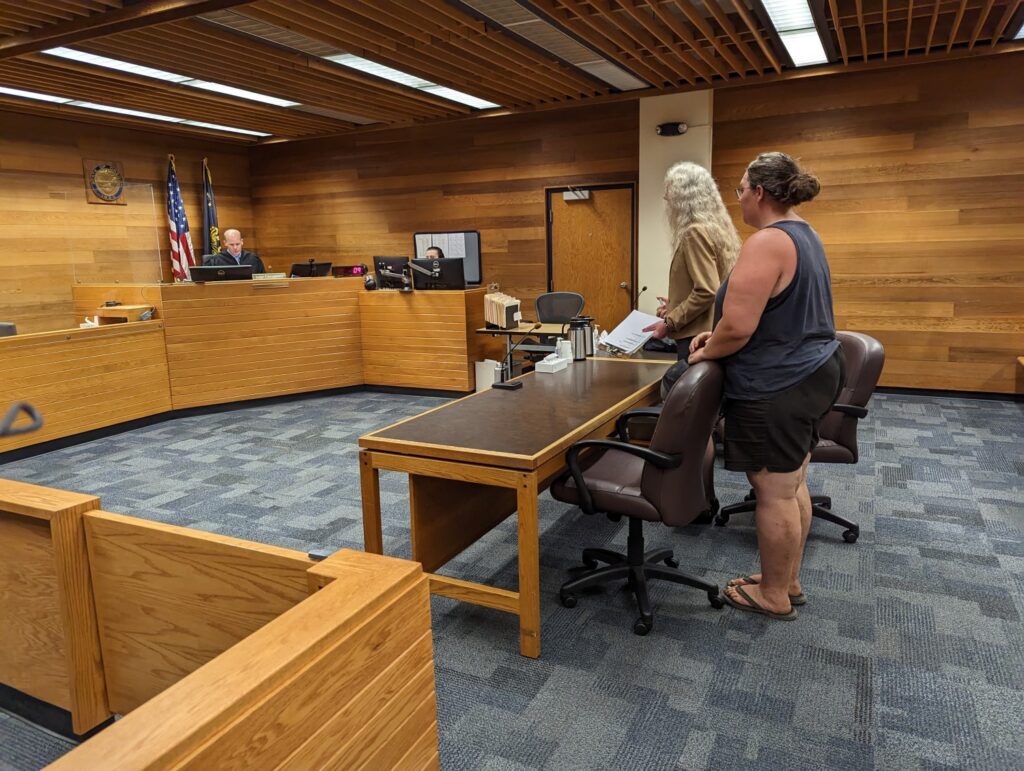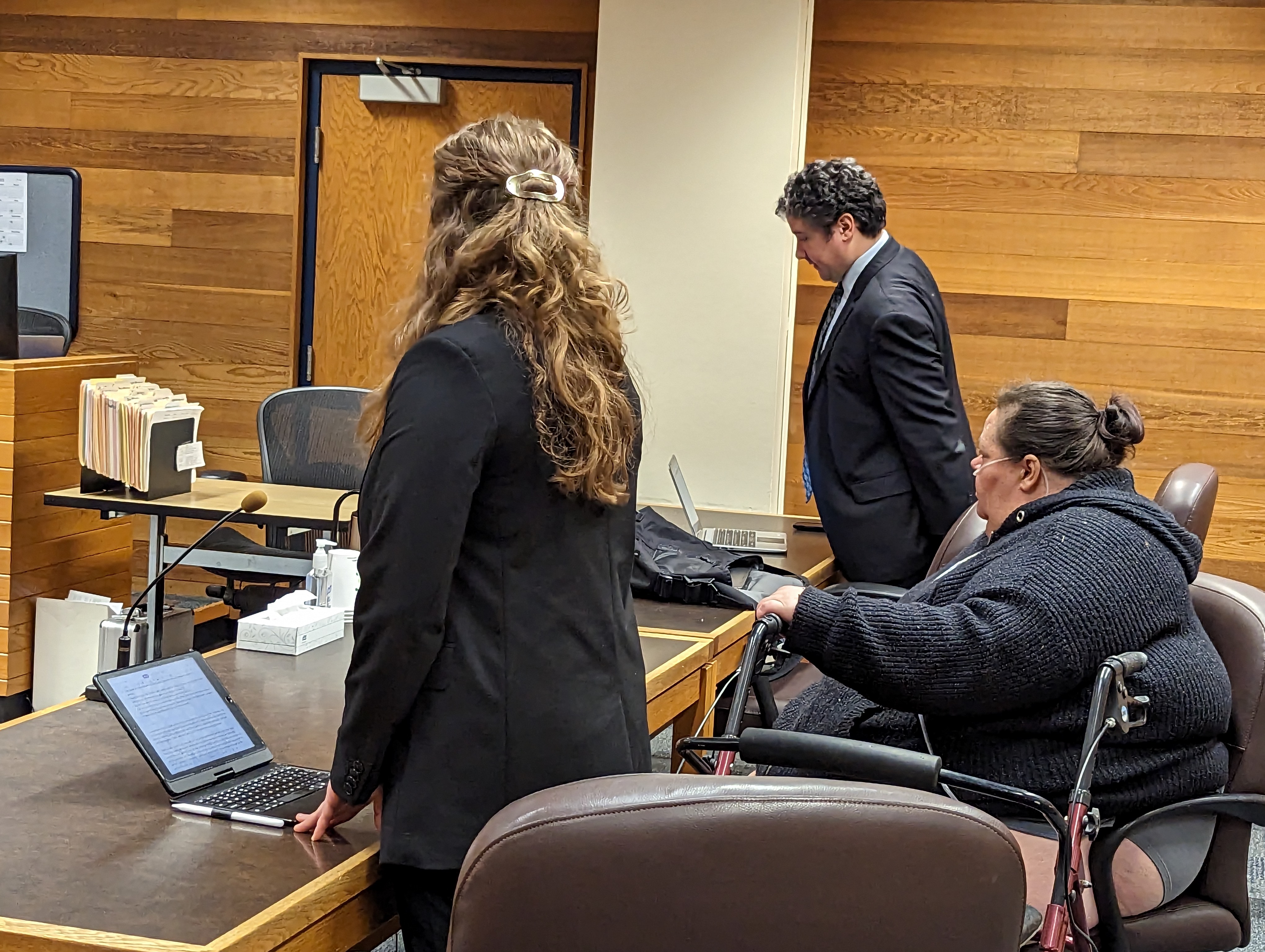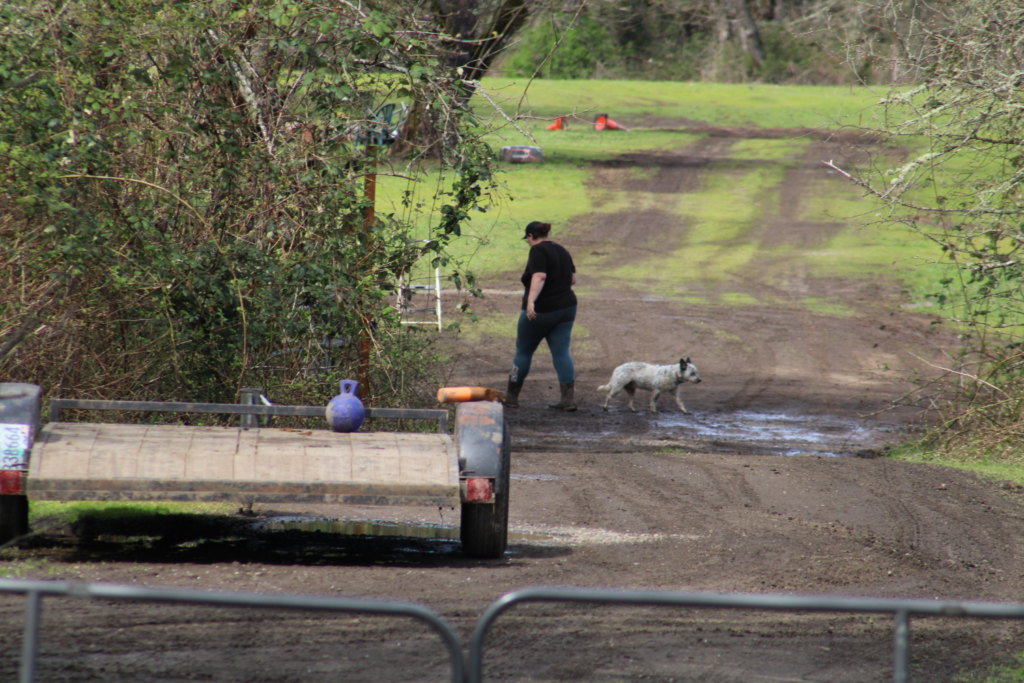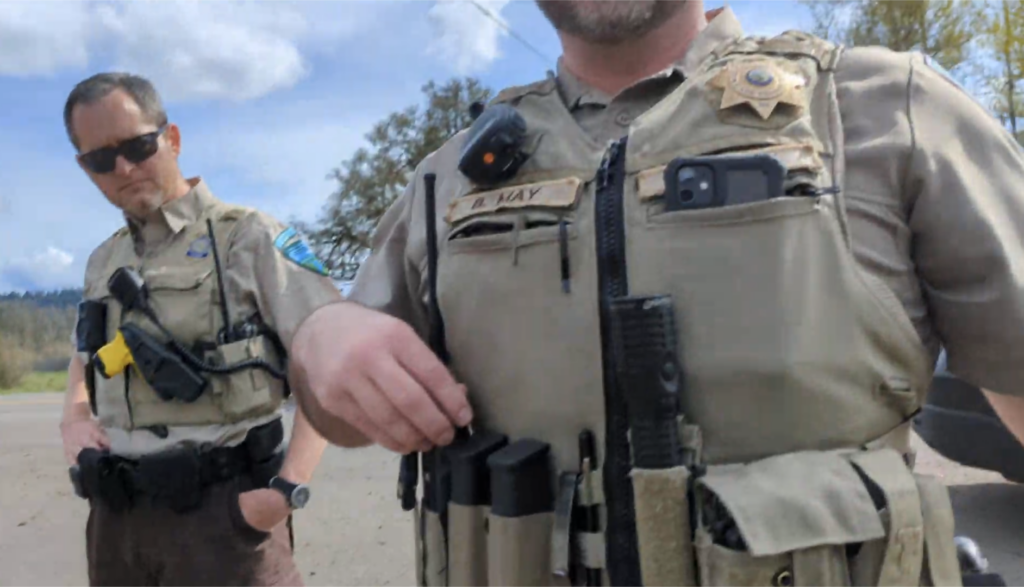Eugene, Ore. – A woman convicted as part of a notorious 2019 horse neglect case in Oregon’s Lane County made a false report to law enforcement that led a reporter to be detained by a sheriff’s deputy and a federal BLM law enforcement officer.
Despite what appeared to be an excessive escalation by a Lane County Sheriff’s Office (LCSO) deputy in detaining one of NW Horse Report’s own reporters and falsely alleging Oregon is a “stop and identify state”– a concept with deep roots in constitutional case law– police appeared to have also intentionally avoided arresting or citing the woman.
The woman, Raina Ott, also had an active warrant after skipping out on a required work-crew offering in lieu of 45-days she was sentenced to earlier this year.
It was unclear if the LCSO also had the legal authority to take the woman into custody for skipping out during the alternate jail service, even before a warrant was again formally issued by the court after an application from prosecutors.
Raina Ott, along with her mother Erica Ott, are tied to a high-profile horse neglect case in 2019 where they– along with the primary neglecter Gwyenth Davies– had over 60 horses seized as part of an investigation by local law enforcement and special agents from the Oregon Humane Society. All three women had been convicted of neglect.
The case received national attention, including coverage from the associated press.
Davies took a plea deal in the case, but was later found to be in violation of probation terms, which was first reported by NW Horse Report. Davies managed to escape jail time and received new probation terms, including more favorable restitution payments that included a significant reduction in monthly restitution payments to $140.
Davies has continued to make her monthly restitution payments, albeit sometimes late, but still owes over $40,000. At the present rate, it will take Davies over a quarter century to repay the debt, most of which is owed to 501(c)(3) Sound Equine Options, as well as some to the Oregon Humane Society.
The Ott’s– who were former associates of Davies– were also later charged in connection with the case on several counts directly connected with their own horses, as State prosecutors uncovered they shared in the care of their own horses. Raina Ott received a deferred sentencing agreement which she then was found to have later violated this year, while her mother Erica was sentenced and received probation– among other terms.

Raina Ott had also been interviewed by KEZI 9 News days after law enforcement executed the warrant and seized over 60 horses in late 2019.
“We’ve got people who are totally innocent in this situation, such as myself, that are just wanting our babies [horses] back.” Ott told KEZI.
But numerous people familiar with the past case along with State prosecutors say the Ott’s situation was far different from other unsuspecting owners who simply boarded and sent their horses to training with Davies.
Davies also claimed to KEZI 9 News that her horses seized from Davies’ facility were perfectly healthy, claims that conflicted with evidence gathered on the Ott’s horses, along with officials with Sound Equine Options who have spent many months rehabilitating one of the Ott’s horses who is still in their care to this day.
Raina Ott previously told NW Horse Report last December during a phone interview that they had frequently been involved in providing care for not only their own horses, but many of the horses boarded and/or owned by Davies back in 2019.
The December interview was conducted in the midst of Oregon’s Special Animal Cruelty Prosecutor Jacob Kamins moving the court to take action against Raina Ott for violation of the “deferred sentencing agreement”, and Ott’s efforts to hide material uncovered by NW Horse Report and numerous readers who provided tips about the Ott’s plans for leaving the State and transporting horses for financial gain.
Shortly after, Ott was sentenced to 45 days in jail by a judge in Lane County, but the judge permitted sheriff’s officials at the Lane County Jail to offer Raina Ott the option of “work crew” in lieu of going into custody for 45 days, angering many proponents calling for strong action against Raina Ott who had been following the case.
Many of those same proponents then stated to NW Horse Report that they have little doubt that Raina Ott would not comply– and according to new court documents just uncovered NW Horse Report– they were correct.
State prosecutor Jacob Kamins detailed in these newly uncovered court documents that Raina Ott only attended a few days of her work before she stopped reporting daily to jail officials. This resulted in a Lane County judge issuing a warrant for Raina Ott’s arrest.
Kamins also filed a motion to “Show Cause” against Raina’s mother, Erica Ott, for also having been found recently to be in violation of her probation terms related to the horses. Among the violations by both Ott was their joint failure to pay restitution.
No warrant was issued for Erica Ott, but she was ordered to appear on May 1st in Lane County Circuit Court.
Days after the incident involving law enforcement, it appears the warrant was eventually executed on Raina Ott and she was also released with an order to appear at the same hearing as her mother.
Both Ott’s did appear at their May 1st hearing earlier last week and ultimately denied through their attorneys the State’s new allegations, but Oregon’s Special Animal Cruelty Prosecutor Jacob Kamins confirmed the obvious from court filings that the parties were likely to negotiate acceptable resolutions.

That includes an implied extension of the probation timeline in Erica Ott’s case and new language for both the Ott’s pertaining to their restrictions involving animals.
It is unclear if Raina Ott is likely to face a new jail sentence and if she would again be permitted any sort of work crew alternatives.
The attorney representing Erica Ott also told the court that her client did not have the means to be involved with animals anymore due to her alleged health problems. She also stated that she currently had a caregiver, in addition to help from her own daughter Raina Ott.
Attorneys for the Ott’s declined to make any comment at this time. Raina Ott’s attorney indicated they would advise her client not to speak with the media.
Raina Ott was not taken back into custody at this hearing despite the past sentence and was released on her own recognizance, pending further court progress on the State’s allegations.
Deputy illegally detains reporter and cites non-existent law
The incident involving law enforcement last week stemmed from NW Horse Report working to obtain photopgrahs of a property allegedly being rented by the Ott’s located on Highway 58 just outside Eugene, a location that some sources are alleging was the site of continued probation violations through an unlicensed business.
While present for only a few minutes, a woman later identified as Raina Ott eventually appeared, potentially arriving within those short minutes driving a Chevy pickup truck with another unknown female who was not identified. We will refer to her first name in this segment to avoid confusion with her mother, Erica Ott.
Eventually, Raina was pictured past a gate in a fenced section of the property yelling unintelligibly due to the noise of highway traffic.
Our reporter yelled back “I’m a reporter, would you like to talk to us?”, but it was unknown if Raina had been able to hear the response while she continued to yell amid the noise of the highway. Our reporter then left the public area of the highway in front of the property after picturing Raina walking back to a camper trailer behind a hedgerow.
Not long after the encounter, while interviewing an elderly woman who was a neighbor of the Ott’s who was detailing some of the issues with loose dogs and concerns she also had for horses seen on the property, a Lane County Sheriff’s Deputy with assistance from a federal US Fish & Wildlife officer arrived in front of the neighbor’s property.
The reporter and elderly woman then went to approach the officers closer to the highway, an initial encounter caught all on camera. The reporter promptly and politely alerted the officers they were recording, as well as identifying themselves as a reporter with NW Horse Report, an established policy for reporters with Equestrian Media Group.
The deputy quickly acknowledged the statement, before our reporter then explained that he assumed they might be responding to a call from one of the Ott’s.
The deputy said, “So it sounds like you’ve been standing at a fence yelling for somebody,”.
“She yelled, I was here and saw a vehicle pull in and was taking some photos, but I was just out to take photographs from the public access of the property, and did that, then a woman came out and she was kinda flipping us off..” our reporter explained.
The elderly neighbor then interjected and said to the deputy, “I’m sure it’s Raina Ott.”

The reporter then explained clearly that most of the filming had been done from the public highway, and at only one point had access down a short unpaved road leading to a gate onto the property been made.
Out of an abundance of caution, having not been able to understand Ott, our reporter did not go back down the unposted road. The reporter had approached the gate prior to the arrival of the vehicle and the encounter with Raina.
In Oregon, trespass requires that “the person enters or remains unlawfully in a motor vehicle or in or upon premises.”
According to an Oregon defense attorney familiar with trespass law, it would require an individual to knowingly refuse to leave an un-posted private property by someone with authority over the property or have entered property clearly posted or secured.
None of these situations applied, but surprisingly the deputy later claimed– when alleging he could have arrested the reporter– that the short roadway leading to the closed gate was indeed posted up closer to the highway.
The deputy’s claim was quickly refuted later on after reviewing a number of detailed photographs showing the entire fenceline and gate– revealing no trespassing signs. Only the neighbor’s property had any posted trespassing signs, but these signs could not have been mistaken for the property the Ott’s are allegedly renting and were nearly 100 yards away from the short unfenced section of road.
Our reporter had remarked in the video that there had perhaps been a trespassing sign at the gate, but it was later confirmed that there was only an “Equine Risk” sign. Even then, the reporter never went past the gate and promptly returned to the public highway.
As the interaction continued our reporter explained, “I’ve never gone past any gate at any point, and generally stayed…” attempting to explain that they then remained back on the public highway, before being interrupted by the deputy.
“So can I ask you why you keep showing up at her house taking photos?” the deputy remarked. While not immediately clear, it did appear the deputy was revealing the false element of the complaint that was called into the police to prompt their response.
“This is the first time I’ve ever been here,” our reporter stated while sounding surprised by the deputy appeared to be approaching the situation by taking the allegation on face value, despite having not even investigated or having yet made contact with Raina Ott.
No other reporters with NW Horse Report had ever been to the location in question, raising serious questions as to the description of the incident being provided by Raina Ott to police dispatch– and perhaps the deputy himself who responded.
The video then captures the deputy asking our reporter, “Why are you wanting to take photos?”… appearing and sounding dismayed by the reporter’s presence and filming.
“I’m a reporter, that’s why.” our reporter replied.
The deputy then asked, “A reporter for what?”
“Equestrian Media Group…” our reporter remarked before being cut off again by the deputy saying, “Okay” while the reporter handed the deputy press identification and started to say, “Happy to…” before once again being cut off by the deputy.
“What are you reporting on?” while looking at our reporter’s press identification.
“We’re reporting on the case that’s been going on for several years that you guys are pretty well aware of.” the reporter stated. The Lane County Sheriff’s Office along with the county’s Animal Services– were both involved in the 2019 case involving Davies and the Ott’s.
Deputy: “Okay, do you have a license on you?”
Reporter: “I’m not going to provide my identification because I haven’t broken any laws, sir.”
Deputy: “So because you’ve been called in and I’m actively investigating a crime you do need to show me your license.”
“Actually, I do not– Oregon is not a stop & identify statute.” our reporter says.
The deputy promptly claimed our reporter was wrong, saying, “It is” a stop & identify State.
There is only one key issue with the deputy’s claim– it’s completely untrue.
Oregon law doesn’t require citizens to disclose their name or ID upon an officer’s demand. Refusing to give your name or ID or failing to carry your ID is generally not an offense, with exceptions being related to driving without a license. The US Supreme Court has previously found other states’ laws requiring citizens to carry or show ID as unconstitutional.
The defense attorney further said after reviewing the video that he thought the deputy’s actions showed a “blatant misunderstanding of the law and the supporting case law,”.
“This officer needs some more training, or it just shows he wasn’t thrilled by being filmed and felt that you shouldn’t be filming even from the shoulder of a public highway, but that’s not illegal at all.”
He went on to explain that he believes from experience that some officers get a false sense of entitlement when they demand a citizen, let alone a journalist, do something– including providing ID.
“Most citizens and former clients of mine often provide their ID and other information, because they believe they legally have to and could be arrested if they don’t,” he said.
“I would not be surprised if anyone believed by this officer’s demeanor and approach that they might be arrested if they didn’t comply with his demand to provide identification, or implying they must leave the side of the public highway in order not to be detained any longer.” the attorney said.
“He didn’t appear to approach the situation asking about the reporter’s side of the story and showing an intent to professionally investigate, that’s obvious– and it’s clear he came in there believing the complainant’s story and or not liking what the reporter was doing.”
The attorney spoke on the condition of anonymity and as a subject matter expert only, not as counsel for our reporter for Equestrian Media Group.
The details behind Stop & ID laws & established constitutional case law
Even in states with “stop & identify” laws, the US Supreme Court– along with other federal and state court rulings– has repeatedly and consistently found that the requirement to carry ID is unconstitutional when not stopped for a violation or crime involving the operation of a motor vehicle.
In such cases, and only when the officer also still has reasonable articulable suspicion of a crime, may it potentially be a crime if you fail to provide your name, and in some States their date of birth.
Since Oregon does not have any stop & identify statute, persons are not required to answer such questions or identify themselves if stopped by law enforcement, and refusing to do is not a crime.
A refusal to give your name or ID isn’t a separate offense and you cannot be legally arrested or jailed for that refusal, even if ultimately being placed under arrest for another offense.
And while the ruling in the famous US Supreme Court case Terry v. Ohio found that officers can also perform an investigatory stop with an external patdown, also known as “stop and frisk”, but only in cases where the officer believes the person “may be armed and presently dangerous”. It established officers must have “reasonable suspicion” that the person has committed, is committing, or is about to commit a crime in order to identify, and only in the states with such laws.
While there have not been a clear set of tests established on what is considered reasonable suspicion, the courts have well established that it is based on the “totality of circumstances”, and an individual’s complaint about an alleged activity– especially related to simple trespass and an officer not having witnessed the alleged trespass– likely does not rise to the level of providing the reasonable suspicion of a crime.
One of the elements outlined by the court was that “a police officer observes unusual conduct by a subject.”
If that were the case, every mere allegation and complaint made with police by an individual could subject the alleged suspect to an unreasonable violation of their constitutional right under the fourth and fifth amendments.
LCSO Deputy detains reporter for exercising rights, attempts to intimidate reporter into leaving public area
In the case of our reporter, they had already identified themselves through press credentials as well as verbally, which would have clearly met the requirements to identify even if Oregon was a “stop & identify” State (which it is not).
Again, the US Supreme Court has held even in States with stop & identify laws, requiring an actual identification card cannot be required, only that they provide their name, and in some states their date of birth.
This gives rise to our reporter’s allegation that the deputy’s action of detention was also for the refusal to provide an actual license, despite having given their name and other details which itself was not required (but in accordance with EMG policy).
It later also became clear– as will be seen in the details of the continued interaction– that the deputy was prepared to end the “detention” if our reporters simply left the area and ceased engaging in press activities that were protected by the Oregon State & US Constitution.
After being falsely told by the deputy that Oregon is a “stop & identify” state, our reporter calmly said, “I am not going to provide my identification, I was happy to provide you that.” referring to his press ID.
“So at this point though, I have someone calling in that you’re possibly trespassing on their property, okay” the deputy says, with our reporter responding, “Do you know I was actually trespassing?”
“No” the deputy clearly says.
Our reporter, who is also a former law enforcement officer, went on to state, “Sir, investigate– am I being detained or am I free to go?”
The deputy then went on to confirm he was detaining our reporter, “So right now you’re going to be detained, okay?”
“Okay, I have nothing further to say– I’d like to speak to an attorney.” our reporter says.
The deputy then says, “So at this point then,” pausing for a few seconds, “…are you going to be leaving the property?”
Again our reporter repeated that they were invoking their right to remain silent and consult an attorney, “I’m not making any statements until I speak to an attorney.”
This all being said despite clearly being on the side of a public highway and not on any private property, an area that is normally found to be considered a “traditional public forum” in Supreme Court cases involving first-amendment protected activities that include free press and free speech.

This response by the deputy appears to make clear that the detention of our reporter was indeed for exercising their legal rights– signaling that the reporter was free to go if they were willing to simply leave and cease engaging in legal press activity that Raina Ott had allegedly was upset about, not that the detention was actually part of the deputy’s need to actually investigate the (falsely) alleged trespass.
The deputy had been made aware that they arrived while our reporter was in the middle of an interview with one of Ott’s neighbors, with the encounter happening in front of the unnamed neighbor’s property, not the Ott’s.
Our reporter believed the deputy’s demeanor then became more condescending, with a response to invoking his right a second time, “Go ahead and call your attorney” he says, while our reporter then remained silent.
After a brief moment, the deputy says, “If you want to speak to an attorney, you can call your attorney.”
Our reporter again remains silent. The deputy then gestures to the BLM Law Enforcement Officer saying, “Can I talk to you real quick?” before the two move to the other side of the deputy’s patrol vehicle to apparently discuss the situation.
Both officers later refused to fully identify themselves when requested by our reporter, which is believed to be a violation of policy for both agencies.
The BLM officer also later stated that his body camera was not recording and refused to turn it on when politely requested by our reporter, and also stated he was only there to back up the deputy for officer safety. However, this raises questions considering the obvious discussion that then happens between the officers following our reporter’s detention.
As the officers step away briefly our reporter, who is also a former federal law enforcement officer, can be heard saying “Wow”, expressing is shock at the entire encounter. The recording ends a few seconds later as it was recorded by our reporter’s cell phone and not his camera being used for still photography.
Our reporter also then attempted to speak with officials at the Lane County Sheriff’s Office, receiving no response for days until they walked into the Sheriff’s office asking if the Sheriff or another official would be willing to comment or have an off-the-record conversation about the incident, expressing an interest in ensuring this kind of encounter did not happen again.
A staff member who works directly with the Sheriff or the Undersheriff came out to speak with the reporter, but then promptly declined to continue the conversation after seeing the reporter’s clearly visible microphone and saying she didn’t want to speak if being recorded.
Our reporter said he then pointed to a sign mere feet away next to a video camera in the sheriff’s office lobby that said audio and video recording in progress, but this did not dissuade the official from refusing to speak further.
Not long after, Public Information Officer for LCSO Tom Speldrich, called NW Horse Report to speak about the incident. Speldrich ultimately expressed that any off-the-record conversation with LCSO officials, even in the interest of a productive conversation to avoid this issue for all reporters with Equestrian Media Group, would not be possible– essentially saying the only option forward would be to initiate a “complaint” on the officer.
This made clear that LCSO officials did not appear interested in any collaborative effort to avoid potential conflicts with reporters in the future. Speldrich did however express that their agency supports the role journalists play in public transparency.
NW Horse Report was also not able to obtain the deputy’s full name and information until our reporter formally initiated the complaint against the deputy, which was done just over a week following the interaction.
Once our reporter indicated the potential of filing a complaint and protested the deputy not fully identifying himself originally when requested, Speldrich provided the deputy’s name.
Speldrich declined to provide the name of the BLM officer involved, but only confirmed it was a BLM law enforcement officer and directed NW Horse Report to that agency.
Officials with BLM Law Enforcement in Washington D.C. and with a local office in Springfield, Oregon, have not returned multiple requests for information, including the officer’s identity. A BLM official with an office in Prineville confirmed it was not one of their officers, and also expressed that their officers always identify themselves when requested and are supposed to record interactions with citizens using their issued body-worn-cameras, both things the BLM officer refused to do.
Our reporter and the deputy’s full name are not being disclosed out of respect for the ongoing internal investigation at this time, with our reporter expressing hope that it will at “minimum involve significant education for the deputy on well-established constitutional case law and department policy”.
Speldrich initially said he would like to provide his thoughts if we sent a copy of the video of the encounter, but by the start of May, it appeared he would not be providing further comment or context to the interaction when asked, leading to the complaint eventually being filed.
NW Horse Report will provide an update to this story at a later time as more details emerge, including the specific details of the false complaint allegedly made by Raina Ott that led to the encounter with law enforcement.
The assumed parts of her alleged complaint based on the deputy’s statements, including the filming from the public and yelling back and forth with her (albeit due to the traffic noise), were clearly not illegal and simply a constitutionally protected activity the Ott’s did not appreciate.
Speldrich also confirmed that LCSO does have a specific policy for its deputies involving interactions with members of the media when clearly identified. A records request for the documents containing this and other LCSO policies is underway.
Our stance on attempted suppression of free press activities & increases in suppression against reporters
NW Horse Report and Equestrian Media Group have repeatedly stood by media partners and fellow journalists in cases of the government attempts to suppress free speech, including the recent case in which the Bend Bulletin and others refused to abide by a judge’s unconstitutional “gag order” in a criminal trial in Jefferson County that went so far as to order that media could not print any story during the course of the trial.
Like most media publications, our expectation does not imply a belief that reporters are in any way exempt from laws that are constitutional.
This also included a recent case involving OPB reporter April Ehrlich who was arrested by Medford Police for a 2020 incident in which her attorneys claim her rights were violated. The charges against Ehrlich were dismissed by a judge late last year.
NPR for Oregonians then reported, “In a twist from earlier developments an Oregon Public Broadcasting reporter is back in court, but now as the plaintiff, and the City of Medford as the defendant.”
Ehrlich is now suing the City of Medford and Medford Police in federal court.
Ehrlich’s case drew the attention of free press advocates and journalist organizations, including the Society of Professional Journalists and the Reporters Committee. Media organizations have been noting a dramatic spike in arrests, detainments, and assaults against reporters in recent years, including Ehrlich’s case.
Cases of detainments and other suppression by government officials and police are also often less reported than cases of the arrests of journalists. This is why Ehrlich encourages other reporters to read up on their rights and prepare themselves for similar confrontations.
Earlier this year, a national case involving a NewNation reporter being arrested in Ohio after a confrontation involving the State’s Adjutant General of the National Guard at a press conference involving the Ohio governor.

The incident gained significant attention and rebuke from media organizations, journalists, and the general public.
Governor Mike DeWine swiftly called for the reporter’s release from jail and said the reporter should never have been arrested. The charges against the NewsNation reporter Evan Lambert were promptly dismissed by prosecutors.


